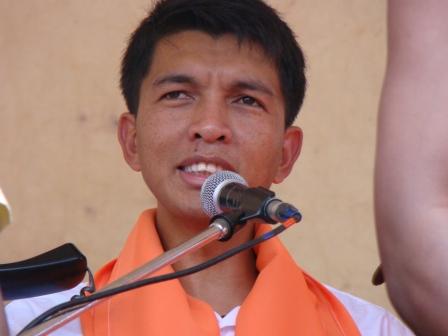Pop power: ex-DJ confirmed as Madagascar's new leader
 Antananarivo - Madagascar's new interim President Andry Rajoelina is a former DJ with under two years experience in politics, none at national level, and who at 35 is five years too young to lead the country, according to the constitution.
Antananarivo - Madagascar's new interim President Andry Rajoelina is a former DJ with under two years experience in politics, none at national level, and who at 35 is five years too young to lead the country, according to the constitution.
Rajoelina's victorious bid to oust the democratically-elected Marc Ravalomanana as president through two months of street protests has startled the international community, both by its daring and disregard for the ballot box.
While accusing Ravalomanana of trampling democracy for squashing media freedom and using excessive force against civilians, the diminutive leader has himself relied on the street and the military to put him in power, instead of elections.
Nicknamed TGV (the French high-speed train) after his party and his crusading style, Rajoelina has ridden a wave of popular discontent since being elected mayor of the capital Antananarivo in December 2007 in a landslide.
Many Madagascans had grown disillusioned with Ravalomanana, a self-made dairy millionaire, who himself was feted after coming to power in 2002 through street protests but with the difference that he had defeated dictator Didier Ratsiraka in elections the previous year.
While earning praise from the West for opening up Madagascar to foreign investment and overseeing strong growth, Ravalomanana's attempts to tackle poverty were deemed inadequate as rising food prices squeezed the population of mostly subsistence farmers.
His power began to unravel after he attempted to silence Rajoelina in December for broadcasting an interview with the exiled Ratsiraka.
Rajoelina used his communication nous as a former event manager to transform a protest over the shutdown of his television station into a relentless campaign to oust the president.
He draped himself in orange - the colour of the 2006 Ukrainian popular revolution - and attracted large crowds of young people and the unemployed to festive rallies.
He proclaimed himself leader and proceeded to act as if he were, appointing his own interim government and using the cover of street protests to try to install them in office but always shying away from violence.
Ravalomanana himself helped him the final mile by using excessive force to quell the campaign that had at times looked to be losing steam as ordinary Madagascans tired of the accompanying looting and economic tough times.
The turning point came on February 7 when presidential guards mowed down 28 unarmed demonstrators outside Ravalomanana's offices on his orders, eroding support for the increasingly authoritarian leader.
The army turned against him over the mounting civilian toll and over widespread reports that foreign mercenaries were helping him cling to power.
While the troops initially pledged to remain neutral their support for Rajoelina became clear when they stormed Ravalomanana's empty city-centre offices Monday and shepherded him through the streets the next day in a victory parade.
While Rajoelina's confirmation by Madagascar's constitutional court as interim leader Wednesday is expected to restore calm to the island in the short-term, analysts say the silent majority of Madagascans, and elements of the military are uneasy about the turn of events.
They say the calm could be short-lived if, as some fear, Rajoelina, also disappoints.
Critics listening to his promise Wednesday of a better life for all, including plentiful cheap food and new hospitals, said his speech was eerily reminiscent of Ravalomanana's victory speech seven years before. (dpa)